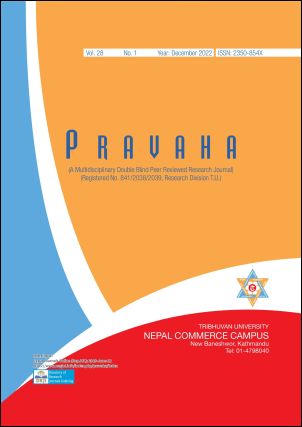Eco-feministic Reading of Sarah Joseph’s Gift in Green
DOI:
https://doi.org/10.3126/pravaha.v28i1.57972Keywords:
Eco-inimical, Encroachment, Ecofeminism, Eco- friendlyAbstract
This article brings forth the idea of eco-feminism in Joseph’s novel, Gift in Green to critique the male characters such as Dinakaran, Kumaran, Markose and Ambu who involve in so-called developmental works through constructions and the encroachment of the resources of the island turning its agricultural lands into concrete jungles. It also brings the female characters such as Ponmani, Kunjootan, Shailaja, and Karthiyani into limelight, who love and attach themselves with farming, fishing and cultivating. They have passionate attachment with the mother earth. They do not do any harm to the land and the landscape of Aathi. They hate people who come to buy land there. They also do not like people who sell and lease their productive land for money and job. They have special attachment with the water and land of Aathi. They have also protested against the idea of constructing bridge. They also love animals and birds of the island. They are living in a perfect harmony with the nature and its beauty. Female characters are striving to keep the ideal of Aathi intact by performing eco-friendly activities unlike males who are performing eco-inimical activities that finally bring destruction in the island. Hence, women are seen as being domestic, pious, moral, pure, gentle, kind, graceful, simple and beautiful, have soft corner for the nature while men are seen as hard-working, encroaching, industrial, rational, assertive, and independent and proud; none of which is easily connected with nature. Therefore, nature is seen as the embodiment of all the characteristics that women possess.
Downloads
Downloads
Published
How to Cite
Issue
Section
License
© Nepal Commerce Campus, TU
Authors are required to transfer their copyright to the Nepal Commerce Campus, TU.




